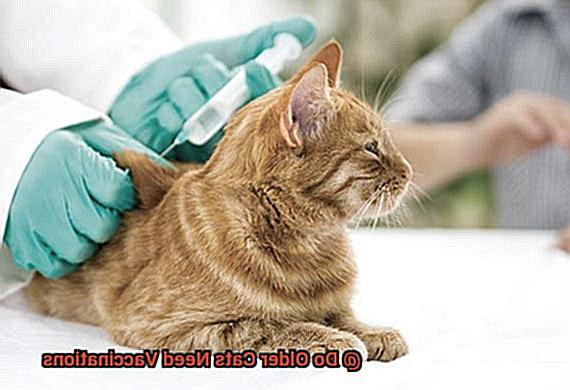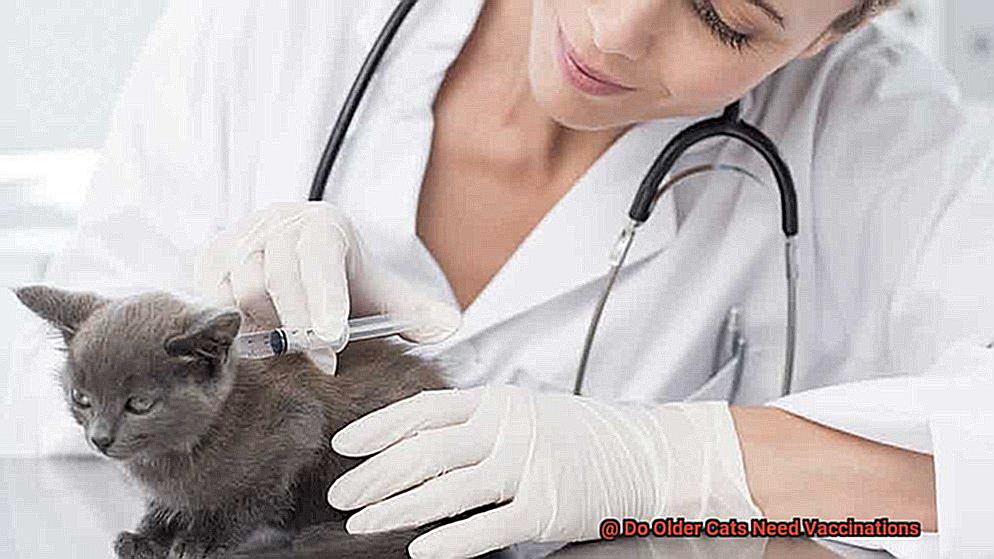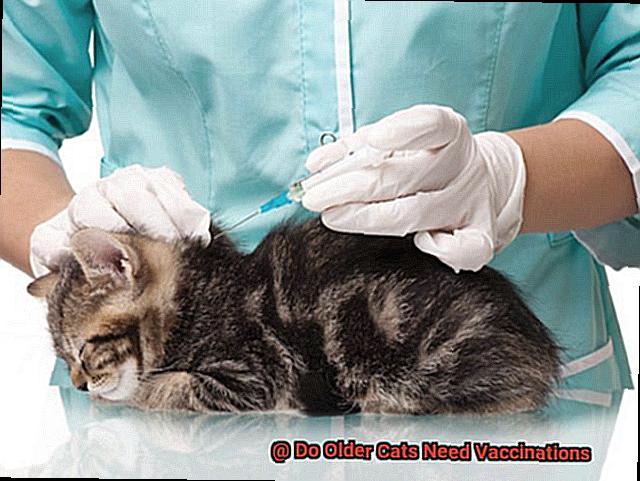As a devoted cat owner, you may be pondering whether your beloved senior kitty still needs vaccinations.
It’s natural to wonder, especially since your feline friend has probably already received numerous vaccines as a kitten. However, the answer to this question is unequivocally “yes.”
Just like humans, cats’ immune systems tend to weaken as they age. This makes them more vulnerable to illnesses and diseases that could be prevented with proper vaccination.
Moreover, older cats are more likely to have underlying health issues that can impact their immune system even further. As a result, keeping up with vaccinations becomes even more critical as your cat grows older.

Now you might be thinking, which vaccines should my senior cat receive? There are core vaccines that are recommended for all cats regardless of age, such as rabies, feline herpesvirus, calicivirus and feline panleukopenia virus.
However, depending on your cat’s lifestyle and health status, additional vaccinations may be advised. In this blog post we’ll explore why vaccinations are so essential for senior cats and which vaccines are recommended for them.
So let’s get started now.
The Vaccination Needs of Older Cats
However, as cats age, their immune systems weaken, leaving them more vulnerable to diseases and infections.
Vaccines are a crucial tool in safeguarding their health, and this is especially true for senior cats. While some vaccines are necessary for all cats, others may not be as crucial for older felines who have already developed immunity over time.
It’s always best to consult with your veterinarian to determine which vaccines are necessary based on your cat’s unique needs. The American Association of Feline Practitioners recommends that senior cats receive a comprehensive geriatric evaluation annually, including an assessment of their vaccination status.
As cats get older, their vaccination needs may evolve. Some vaccines may become less effective while others become more important in protecting against illnesses that can pose a greater risk to older cats.

One vaccine that remains vital for all cats is the rabies vaccine. In some states and jurisdictions, it’s even illegal not to vaccinate your cat against rabies.
This disease is serious and potentially fatal, and it can also be transmitted to humans. Even if your cat is strictly an indoor pet, vaccinating against rabies is still considered a wise precautionary measure.
For indoor cats specifically, recommended vaccines include rabies, feline viral rhinotracheitis, calicivirus, and panleukopenia. The frequency of these vaccines may vary depending on the vaccine and your cat’s overall health status.
Regular check-ups with your veterinarian can help determine which vaccines are necessary based on your cat’s individual needs.
Types of Vaccines for Senior Cats
Their immune system naturally weakens, making them more vulnerable to diseases and infections.

Fortunately, there are vaccinations available to safeguard their health and wellbeing, especially for senior cats. So, what types of vaccines are recommended for senior cats?
Let’s take a closer look. Firstly, the FVRCP vaccine is highly recommended for senior cats as it protects against three viruses – feline viral rhinotracheitis, calicivirus, and panleukopenia.
These viruses can cause respiratory infections, fever, and gastrointestinal distress in cats of all ages. However, for senior cats with weaker immune systems, these diseases can be much more severe and even life-threatening.
By vaccinating your senior cat against these viruses, you can help them avoid these unpleasant symptoms altogether. Secondly, rabies vaccination is an essential preventative measure for senior cats as it is a fatal disease that can be transmitted through the saliva of infected animals.
Not only does vaccinating your cat protect their health, but it also ensures public safety. As responsible pet owners, it’s our duty to ensure that our furry companions are not only healthy but also safe to be around.
Lastly, the Feline Leukemia Virus (FeLV) vaccine is highly recommended for senior cats as they are more susceptible to this contagious virus that can cause immunodeficiency, cancer, and other diseases in cats. By vaccinating your senior cat against FeLV, you’re giving them an extra layer of protection against this dangerous virus.
It’s essential to note that not all vaccines are necessary for every cat. Your veterinarian will assess your cat’s individual risk factors and recommend the appropriate vaccinations based on their lifestyle and health status.
Furthermore, booster shots may also be necessary to maintain your senior cat’s immunity. These booster shots will be recommended by your veterinarian based on your cat’s individual needs.
Benefits of Vaccinating Older Cats
Fortunately, vaccines are an essential tool in safeguarding older cats from serious and sometimes fatal illnesses. So, what exactly are the benefits of vaccinating senior cats?
Firstly, vaccines provide protection against preventable diseases. Older cats are more vulnerable to diseases such as Feline Leukemia Virus (FeLV), Feline Immunodeficiency Virus (FIV), and rabies.
Vaccines protect cats against these diseases, preventing their immune systems from fighting off the infection. Therefore, vaccinating your senior cat is essential in ensuring their long-term health.
Moreover, vaccines help boost the cat’s immune system and prepare it to fight off infections. This is particularly important for older cats who may have weaker immune systems and are more vulnerable to infections.
By boosting the immune system, vaccines improve the cat’s overall health and quality of life. In addition to being beneficial for the cat’s health, vaccinating older cats is also cost-effective.
The cost of treating a cat that has contracted a preventable disease can be significant compared to the cost of a vaccine. Vaccinations can save cat owners a significant amount of money in vet bills.
Lastly, vaccines not only protect the vaccinated cat but also other cats in the household from contracting the disease. This is particularly important if there are younger or immunocompromised cats in the household.
By vaccinating your senior cat, you’re not only protecting them but also other members of your fur family. In conclusion, vaccinating older cats is an essential part of maintaining their health and well-being.
Vaccines provide protection against preventable diseases, boost immunity, and are cost-effective. Moreover, they protect other cats in the household from contracting the disease.
Therefore, it is crucial to consult with your veterinarian to determine which vaccines are necessary for your cat’s age and lifestyle.
Risks Associated with Not Vaccinating Senior Cats
Not vaccinating senior cats can lead to severe health complications, financial costs, and potential disease outbreaks.
It is essential to understand the risks associated with not vaccinating senior cats to make informed decisions about their healthcare.
The first significant risk of not vaccinating senior cats is the increased susceptibility to infectious diseases like Feline Leukemia Virus (FeLV), Feline Immunodeficiency Virus (FIV), and rabies.
These diseases can be transmitted from other cats or wildlife, and unvaccinated senior cats may experience severe and life-threatening symptoms when infected.
By vaccinating our senior cats, we can shield them from these illnesses and boost their immune systems to improve their overall health and quality of life.
Another risk associated with not vaccinating senior cats is the potential for a disease outbreak in their living environment. If an unvaccinated cat contracts a disease, it can quickly spread to other cats in the household or even to other pets in the neighborhood.
This could lead to an epidemic that could have been easily prevented by simple vaccinations. By vaccinating our senior cats, we are also protecting the health of other pets in our community.
Not vaccinating senior cats can also lead to significant financial costs if they become ill. Treating a serious illness in a senior cat can be expensive, and preventative vaccinations are significantly cheaper than treating an illness later on.
By investing in regular vaccinations for our senior cats, we are also investing in their long-term health and saving ourselves from unnecessary medical expenses. It is important to note that certain vaccines may not be necessary for every senior cat.
Your veterinarian can help determine which vaccines are appropriate for your cat based on their lifestyle and overall health.
However, it is generally recommended that senior cats continue receiving core vaccinations such as rabies and FVRCP vaccines throughout their lives.
So, it is our responsibility to ensure our senior cats receive proper care throughout their lives. Regular vaccinations protect them from severe health complications, financial costs, and potential disease outbreaks.
Alternatives to Traditional Vaccinations for Elderly Cats
Vaccinations are essential to maintain the health of cats, but traditional vaccines may not be the best option for elderly cats. However, pet owners need not worry, as there are alternative options available that can help protect our senior cats.
One effective alternative to traditional vaccinations is the use of homeopathic remedies. Homeopathy takes a holistic approach to healthcare by using natural substances to stimulate the body’s healing abilities.
Using certain homeopathic remedies has been shown to boost the immune system and protect against certain diseases. This can be a great option for pet owners who prefer a more natural approach to their cat’s healthcare.
Another alternative to traditional vaccinations is titer testing. Titer testing is a blood test that measures the level of antibodies in a cat’s bloodstream.
If the cat has a sufficient level of antibodies, they may not need to receive a vaccine. Titer testing can be less stressful for elderly cats than getting vaccinated, and it can also help reduce the risk of over-vaccination.
Acupuncture is another alternative that can help boost an elderly cat’s immune system. Thin needles are inserted into specific points on the body to stimulate healing and promote overall wellness.
This can help reduce inflammation and improve circulation, which in turn supports the immune system. However, it’s important to note that pet owners should consult with their veterinarian when deciding whether or not to vaccinate their elderly cat.
A veterinarian can help assess the cat’s overall health and risk factors for certain diseases and recommend the best course of action. In conclusion, as our cats age, their healthcare needs change, and we need to adapt our approach accordingly.
Traditional vaccinations may not always be the best option for elderly cats, but alternative options such as homeopathic remedies, titer testing, and acupuncture are available that can help protect their health and wellbeing.
Also Read: Do Cats Sleep More As They Get Older?
Conclusion
As a cat owner, you want to do everything in your power to keep your furry friend healthy and happy.
And when it comes to vaccinations for older cats, the answer is clear: yes, they still need them. Just like humans, cats’ immune systems weaken as they age, leaving them more susceptible to illnesses that could be prevented with proper vaccination.
In fact, older cats are even more vulnerable than their younger counterparts because they may have underlying health issues that further compromise their immune system. That’s why it’s crucial to stay up-to-date on your senior cat’s vaccinations.
While there are core vaccines recommended for all cats (such as rabies and feline panleukopenia virus), additional vaccinations may be necessary depending on your cat’s lifestyle and health status. But no matter what vaccines your cat needs, they provide essential protection against preventable diseases while boosting immunity and being cost-effective.
Plus, vaccinating your senior cat doesn’t just benefit them; it also protects other cats in the household from potentially life-threatening diseases. Not vaccinating can lead to severe health complications and financial costs – not to mention potential disease outbreaks.







